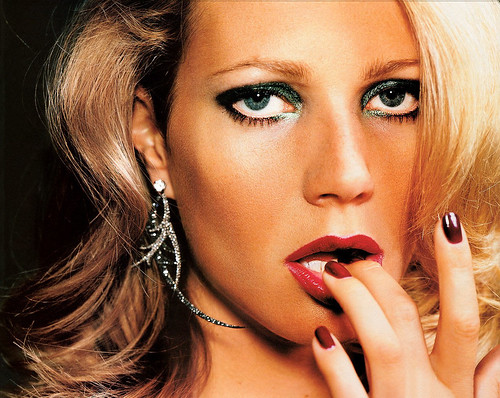
2. 韋思安德森幽閉恐懼症
This is an accomplishment that comes with a price, guaranteeing for the director that everything that followed would look and feel like something: a Wes Anderson movie. Three years later he released The Royal Tenenbaums, a more ambitious ensemble piece about a New York family of gifted children who, as adults, had fallen on hard times. Thanks in part to a cast that included stars like Gene Hackman and Gwyneth Paltrow, Tenenbaums introduced a larger audience to Anderson’s style, which this time out seemed, depending on your tastes, to be either more defined or more distracting. As a meditation on family and adulthood, the film succeeds, movingly, and it certainly made clear how much more exciting American cinema is with someone like Anderson around. But there were moments—remember the Dalmatian mice?—when Tenenbaums risked being a bit too curious with its curiosities. ("Yes, yes, you’re charming, you’re brilliant," chided A.O. Scott in his review. "Now say good night and go to bed.") Then came The Life Aquatic With Steve Zissou, a Jacques Cousteau–inspired fantasia that left even some of Anderson’s most loyal fans impatient. There was a sense that the director had become pickled in a world of his own creation.
成功付出了代價,接下來的作品都將看起來且讓人感覺:這是韋思安德森電影。三年後天才一族,一部更有野心的大堆頭電影,關於一個紐約家族小孩,身為大人,時機歹歹的故事。多虧網羅金哈克曼和葛妮絲派特蘿之全明星陣容,天才一族讓更多觀眾得以接受安德森風格洗禮,這讓,人各有菜,電影越明確或越不定。省思家庭與成人期,電影獲得好評,觸人心弦地,顯而易見地,美國電影有安德森這號人物更加令人興奮。不過有時候—還記得那隻大麥町滑鼠嗎?—好奇差點殺死譚能堡家族。(「是是是,你很迷人,你很聰明。」阿Q史考特在他的影評指責。「讓我們互道一聲晚安,然後上床睡覺。」) 接著是海海人生,賈克考司篤啟發靈感的幻想曲,讓某些安德森死忠影迷都有些不太耐煩。這位導演似乎被他的海海人生困住了。
Jacques-Yves Cousteau 1910~1997
Novelty has a shelf life. Aquatic was seen as a beautiful failure, a study in style stripped of substance. In talking to Anderson you can tell that Aquatic was a difficult movie for him—beginning with its making. Like just about everything in his life, Anderson prefers a movie set to be a communal and intimate environment, which was difficult to maintain while dealing with the cold world of sound stages, special-effects crews, and the heightened expectations that come with an ever-expanding budget. (Aquatic cost close to $60 million, more than twice what Tenenbaums did.) "There were so many damn trailers," he says of the filming process. “Every actor had like three trailers. And it’s not just the expense, but when you have all your actors watching ESPN on satellite, they’re not thinking about the work, so you have to pull them into it. You tell the actors you’re ready, you wait, you check their makeup, you monkey around, you wait some more—all of this over and over, and it doesn’t make the movie any better." Discussing it seems to exhaust him, as if he were reliving the experience. "We just put everything into it, and it kind of, you know, got a bit of a rough ride," he concludes. "I think it’s generally thought of as the least loved of all my movies."
新鮮感有其耐用年限。海海人生被視為美麗的失敗,華而不實。和安德森聊過你可以認識到海海人生是個困難的電影—從拍攝過程說起。就像生活裡其他事物,安德森喜歡把電影設定在一個共有,親密的環境,在對付攝影棚,特效團隊,高預算高期待的冷酷世界時是很難維持的。(海海人生耗資近六十百萬美元,大於天才一族乘以二。)「好多該死的明星車。」他提到拍攝過程,「每個演員有三輛明星車。這還不打緊,當所有演員都在看衛星體育頻道,他們沒心情工作,所以你得把他們拉回來。你告訴他們你準備好了,你等,你看他們的妝,你猴子逛大街,你還要再等—日復一日,電影也沒有因此更好。」討論這話題似乎讓他快喘不過氣,好像又身歷其境般。「我們投入所有心力,最後,你知道的,不是很順利。」他下結論。「那大概是我的電影中最不可愛的事情了。」
It’s hard to gauge how personally Anderson has taken the criticism. At one point I bring up a recent essay by Michael Hirschorn in the Atlantic Monthly arguing that, as a culture, we are "drowning in quirk," an aesthetic he defines as the "embrace of the odd against the blandly mainstream." Citing Anderson’s movies as a prime example, Hirschorn claims that the problem with quirk is that it "can quickly go from an effective narrative tool to an end in itself." Anderson, who in person is typically quite calm, becomes suddenly animated by the topic. "You know, I’ve heard that argument a million times, and it’s completely uninteresting to me," he says. "It’s just deadeningly unoriginal. If you have ideas that you think can contribute to a movie, that you think might help you honestly enjoy it more…"He trails off, thinking. "Now I’m sounding bitter, aren’t I? Okay, my response to that is that sometimes it hurts my feelings." Another pause. "When they say a movie I make is smarter-than-thou, that the movie is 'too smart for its own good,' as if we’re making movies to try to show everybody how great and cool we are…well, that’s just not the case. We’re trying our hardest to entertain people, to make something people will like, something people will connect with. I don’t think there’s a great effort to try to make some statement about ourselves, you know?"
安德森有多在意批評是很難想像的。我提到一篇麥可賀雄最近在大西洋月刊指出,這是一種文化,我們「沉溺於古怪」一種他定義為「反抗溫和主流擁抱怪胎」的美學。安德森電影是最佳案例,賀雄主張古怪電影「可以經由有效敘事達到目的。」安德森,本人並不激動,聽到當場激動起來。「你知道嗎?這論調我已經聽過好幾萬次,蜀犬不吠日。」他說。「但也太老套了。如果你想到可以貢獻在電影裡的點子,讓你更樂在其中……」他停下,思索。「我現在聽起來有些難過,對吧?好,我的反應是,有時候韋思安德森感覺很受傷。」另一個暫停。「當他們說我的電影自恃甚高,過度聰明,好像我們拍電影是為了展現自身偉大與酷炫……咳,根本就不是那樣。我們盡最大可能娛樂人們,拍些人們會喜歡的東西,人們心有戚戚焉的東西。我們並未刻意強調什麼,你曉得嗎?」
Some artists thrive on defending their work, on the idea of being in combat with the culture; Anderson is not among them. By the time he was finished promoting Aquatic overseas, in the summer of 2005, he says he found himself feeling depressed. This was not a monumental or debilitating sadness, more like the low-simmering melancholy that defines his characters. He had some ideas for a new project, but they remained stalled in the Anderson gestational phase: sketches of disconnected scenes and dialogue scribbled in the small notepad he keeps in the breast pocket of his blazer.
有些藝術家勢死捍衛自己的作品,與潮流戰鬥時;安德森不是那種藝術家。結束海海人生海外宣傳,時值民國九十四年夏日,他說他感到沮喪。這不是什麼紀念性質或令人衰頹的哀傷,更像是他性格中淡淡的憂愁。新電影已經有些頭緒,但它們仍被擺進安德森子宮裡:不連貫場景與對話,寫在他獵裝胸前口袋裡的小記事本。
Anderson decided that in order to be productive he had to leave New York, where he has lived and worked for nearly a decade—that it would be "interesting" to live outside of America for a bit. The director called up Schwartzman, who was then living in Paris, shooting Marie Antoinette. "Could I maybe crash in your guest room for a bit?” Anderson asked. "Whenever you want," Schwartzman assured him, and shortly thereafter the two were roommates.
為了保持生產力,安德森決定離開紐約,居住工作快十年的紐約—居住於美國以外的地方一會兒將會「很有趣」。導演打電話給巴黎的薛茲曼,瑪莉安端拍攝中。「我可以入侵你的貴賓室一下下嗎?」安德森問。「隨時奉陪。」薛茲曼確認,兩人立刻成為室友。
4. 韋思安德森評柯恩兄弟




沒有留言:
張貼留言